

Problem and purpose of PH education. Philippine Daily Inquirer.
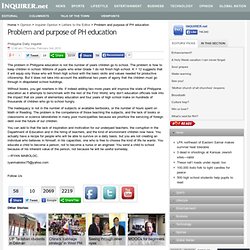
K+12: Teachers not OK teaching PH languages? MANILA, Philippines - The Department of Education (DepEd) has started training teachers on the "K+12" program curriculum.
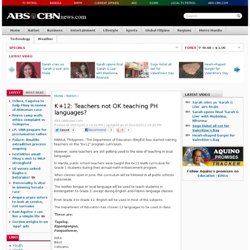
However, some teachers are still getting used to the idea of teaching in local languages. In Manila, public school teachers were taught the K+12 math curriculum for Grade 1 students during their annual math enhancement program. When classes open in June, the curriculum will be followed in all public schools nationwide. The mother tongue or local language will be used to teach students in kindergarten to Grade 3, except during English and Filipino language classes.
K-12 takes effect this June—DepEd. MANILA, Philippines—If you’re a graduating sixth grader this March, then you may as well be among the first to undergo two more years of public high school.
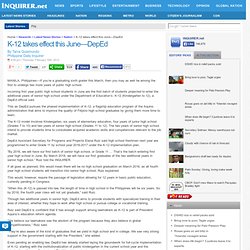
CEAP backs DepEd K+12 program. Manila, Philippines – The head of the Catholic Educational Association of the Philippines (CEAP) fully supports the K+12 program of the Department of Education (DepEd).
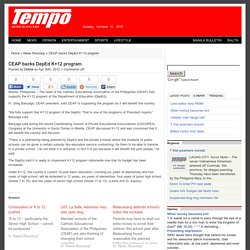
Fr. Greg Banyaga, CEAP president, said CEAP is supporting the program as it will benefit the country. Global employment for Filipinos through K+12 program. WHILE the world continues to progress and move towards advancement, where is the Philippines found as the race continues and the adversities triple in time?
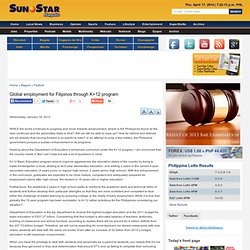
Will we still be able to cope up? How far behind and drained are we already that moving forward is so painful to bare? In an attempt to jump a few meters, the Philippine government pursues a sudden enhancement in its programs. Hearing about the Department of Education’s enhanced curriculum under the K+12 program, I am convinced that the country needs it.
But I can’t help but ask a lot of questions in mind. A Primer on the New K-12 Philippine Education Curriculum - Preschooler. Have a better understanding of our new education system which will be introduced this schoolyear.
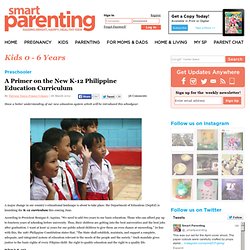
A major change in our country’s educational landscape is about to take place: the Department of Education (DepEd) is launching the K-12 curriculum this coming June. According to President Benigno S. Aquino, “We need to add two years to our basic education. Those who can afford pay up to fourteen years of schooling before university. Thus, their children are getting into the best universities and the best jobs after graduation. Www.depedregion6.ph/pdf/The_Enhamced_ Kto12_Basic_Education_Program.pdf. K+12 program ‘absolutely essential,’ says expert. MANILA, Philippines—Adding two years to the present 10-year basic education cycle is “an absolutely essential reform” to put the country’s public education system at par with the rest of the world, an international education expert said on Wednesday.
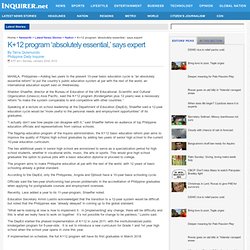
Sheldon Shaeffer, director at the Bureau of Education of the UN Educational, Scientific and Cultural Organization (Unesco) Asia Pacific, said the K+12 program (Kindergarten plus 12 years) was a necessary reform “to make the system comparable to and competitive with other countries.” Speaking at a lecture on school leadership at the Department of Education (DepEd), Shaeffer said a 12-year education cycle would be “more useful to the personal needs and employment opportunities” of its graduates.
“I actually don’t see how people can disagree with it,” said Shaeffer before an audience of top Philippine education officials and representatives from various schools. Recently, Laos added a year to its 11-year-program, Shaeffer noted. DepEd goes K+12 - The Philippine Star » Other STAR Sections » Starweek Magazine. CEBU, Philippines - Mohandas Kandiah, 51 years old from Singapore, completed his 148th marathon yesterday when he took part in the Cebu City Marathon.
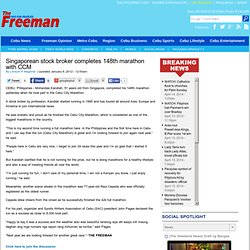
A stock broker by profession, Kandiah started running in 1995 and has toured all around Asia, Europe and America to join international races. He was ecstatic and proud as he finished the Cebu City Marathon, which is considered as one of the biggest marathons in the country. “This is my second time running a full marathon here in the Philippines and the first time here in Cebu and I can say that the run (Cebu City Marathon) is great and I’m looking forward to join again next year,” he said. “People here in Cebu are very nice, I target to join 29 races this year and I’m so glad that I started it here.” But Kandiah clarified that he is not running for the prize, but he is doing marathons for a healthy lifestyle and also a way of meeting friends all over the world. Freeman ( Article MRec ), pagematch: 1, sectionmatch:
DepEd to train science teachers on K+12 program. K To12 Education Program Of The Philippines. Universal kindergarten law set to improve education in PH. By Alexander Villafania MANILA CITY, METRO MANILA–The passage of Republic Act 10157, otherwise known as the Kindergarten Education Act, officially starts the ball rolling for the government’s plans to improve and overhaul the country’s educational system.
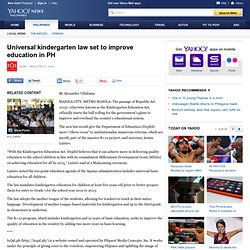
K+12 education program launched. MANILA, Philippines - The local stock market vaulted to a new record peak yesterday, closing above the 5,200 level for the first time on upbeat US economic data and healthy demand for euro zone sovereign debt.

The Philippine Stock Exchange index (PSEi) finished 35.24 points or 0.68 percent higher at 5,204.84 as investors loaded up on shares of DMCI, Philex Mining, Metro Pacific and Philippine Long Distance Telephone Co. Year-to-date, the PSEi has risen by 19.05 percent. “The PSEI closed at its 16th resetting of the record high, settling above the 5,200-line for the first time. We have always contended that if investors choose to focus on the domestic fundamentals above external issues, the bias is unmistakably positive. Today is yet another proof of this proposition,” said Accord Capital Equities Inc.’s Jun Calaycay.
[Blogger] Hegemony in Philippine Education: Rejoinder on K-12 Challenge – Dekonztruktschon. What hope do we have for these children who will spend 12+ years of education? Rod Rivera By Rod Rivera Dekonztruktschon.